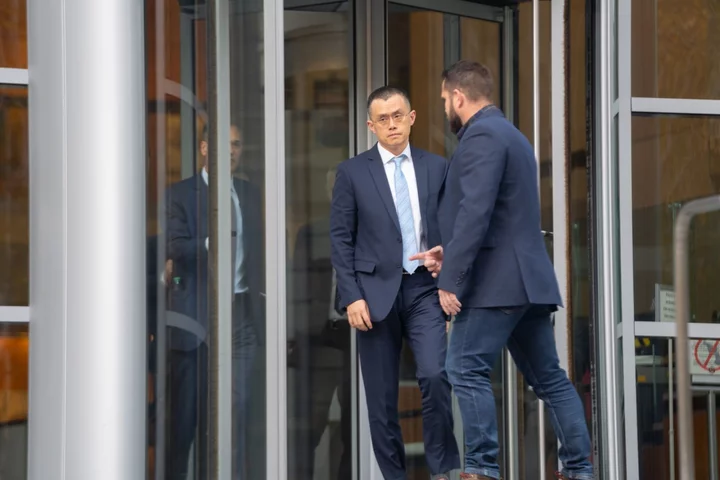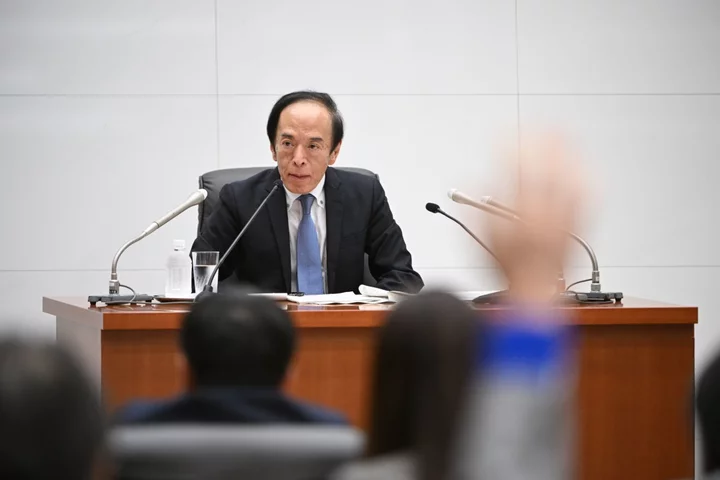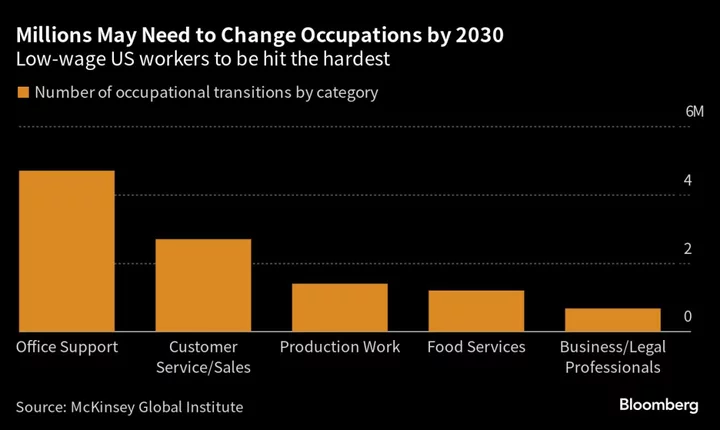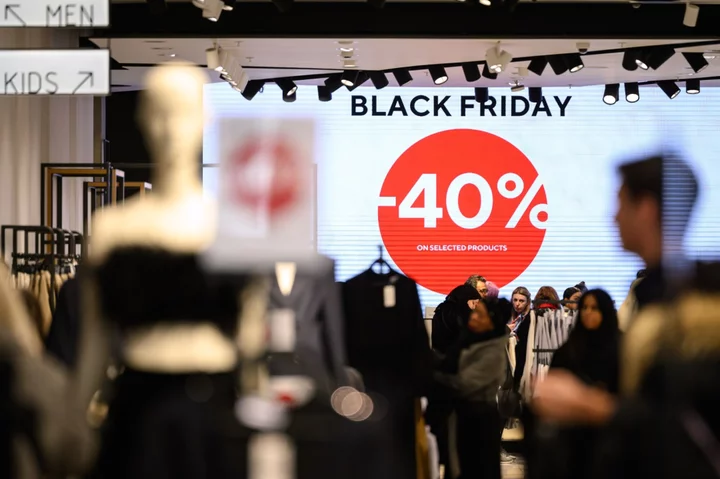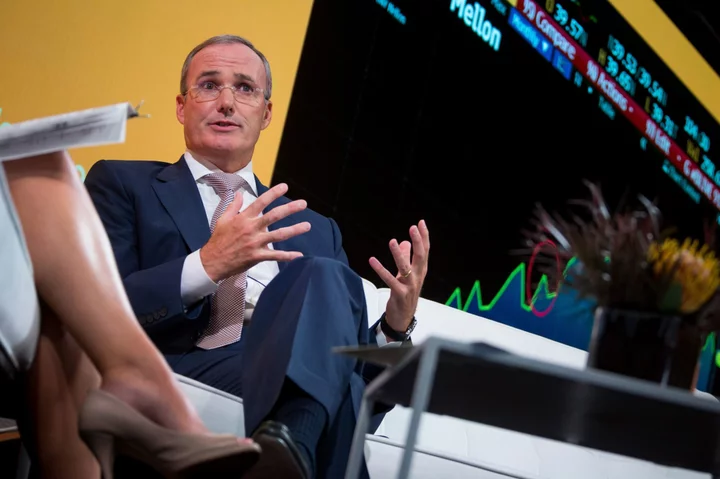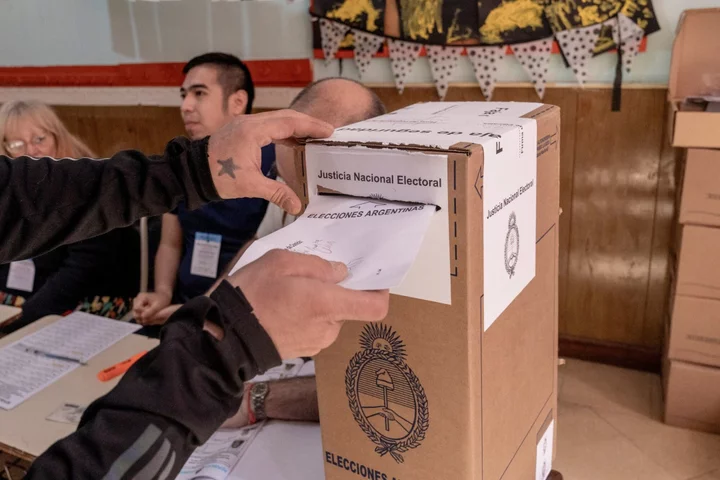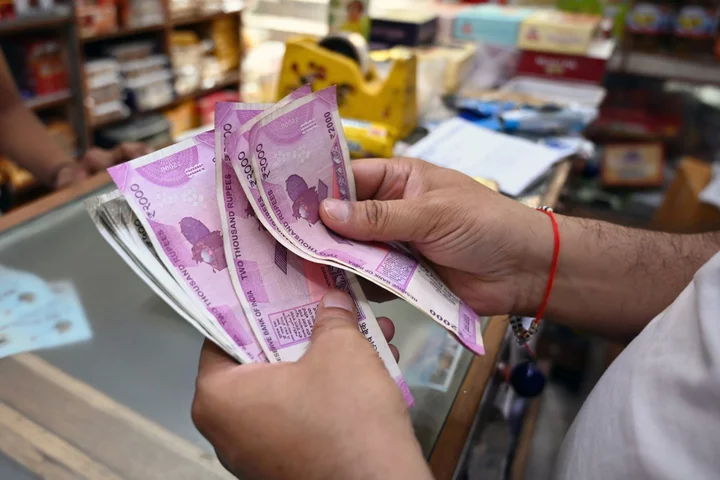As the contours of Binance Holdings Ltd.’s multibillion-dollar settlement with US authorities coalesced in September, some of its biggest traders who were in Singapore attending a conference got a preview.
The bottom line, served alongside a haute, Binance-hosted private dinner in a bustling nightlife district: the largest crypto exchange in the world would survive its American legal troubles.
That evening, a few dozen or so market makers dubbed VIPs entered a dining room at the posh members-only club called 1880. Once inside, guests found their name tags placed on two long tables where they would dine on American Angus beef and bucatini with Australian truffles as Binance executives made the rounds. The studio that designed the 1880 club boasts that guests entering can travel up an escalator through a kaleidoscope tunnel.
Notably absent from the scene was Changpeng Zhao, the firm’s public face who would just two months later plead guilty to a criminal charge in a Seattle courtroom and step down. However, Richard Teng, Zhao’s replacement-to-be, was there mingling with the guests, according to several attendees, who asked not to be identified discussing the private gathering.
As the dinner wore on, the party broke off into smaller groups. Binance officials were asked directly about details on the company’s legal woes.
The assembled traders pressed Binance officials on how much the firm would pay the US Justice Department and other American authorities to settle, including raising the likelihood of a $4 billion penalty. After conversations with company representatives present at the dinner, some VIP guests were left convinced that the firm would pay that sum — an amount Binance could easily afford.
A Binance spokesperson said the depiction of the event was inaccurate, while declining to identify which aspects were wrong.
Read More: Binance Pleads Guilty, Loses CZ, Pays Fines to End Legal Woes
Dubai Tower
After years of jet setting, Zhao had stuck closer to his adopted home of the United Arab Emirates in 2023. His sprawling downtown Dubai apartment is next to the Burj Khalifa, which is the world’s tallest building.
Zhao and Yi He, Binance’s co-founder with whom he has children, didn’t even show up in person at Binance’s own November blockchain event in Istanbul. Since at least May, Zhao had been mentioning on regular Binance leadership calls that he was preparing to step down, according to four people familiar with the conversations, who asked not to be identified discussing internal communications.
The UAE doesn’t have an extradition agreement with the US, so Zhao’s personal legal situation seemed secure. He also has close relationships with powerful Emiratis, and UAE officials were insistent that Zhao hadn’t violated any local laws.
Still, pressure was ramping up. A possible deal earlier in 2023 with the Justice Department that could have been better for Zhao fell though after some officials pushed for him to personally face a stiffer penalty, according to a person with direct knowledge of the matter, who asked not to be identified discussing private deliberations. As months passed, the department pushed for harsher punishment.
Meanwhile, UAE authorities were desperately seeking to be removed from the Paris-based Financial Action Task Force’s gray list, which means increased monitoring and is a blemish on the country’s financial reputation.
Read More: UAE Push to Exit Global Watchdog’s Dirty-Money List Gathers Pace
In the end, people familiar with the discussions, who asked not to be identified due to their sensitivity, said UAE authorities didn’t play a role in Zhao’s decision to voluntarily fly to the US and turn himself in to authorities.
However, Zhao frequently came up in conversations between the US and UAE officials in 2023, according to people familiar with the discussions, who also asked not to be identified discussing the private conversations. By mid-November, Dubai’s Virtual Assets Regulatory Authority was signaling that it wouldn’t grant Binance a full license to operate imminently with a decision about FATF’s gray list looming in February.
A defense attorney for Zhao didn’t respond to a request for comment.
No Headquarters
The company exploded onto the crypto scene in 2017 and almost immediately took on and surpassed larger rivals. It was originally based in China, but following that government’s crackdown on crypto it moved to Japan and eventually to Malta. Officially, Binance says it has no formal headquarters, and unlike a US stock exchange or bank it doesn’t make major company announcements through American regulatory filings.
US probes into Binance date back to 2018 when the company was only a year old. Various arms of the Justice Department and Treasury Department have been involved. The Commodity Futures Trading Commission sued Zhao and Binance in March, and also joined the $4.3 billion settlement last month.
The Securities and Exchange Commission wasn’t part of the settlement announced on Nov. 21, and Wall Street’s main regulator appears to be pressing ahead with its June case against Binance and Zhao for allegedly mishandling customer funds and allowing Americans to illegally access the platform.
Binance and Zhao asked a judge to have the SEC lawsuit against them dismissed, arguing that the agency overstepped its authority in suing them.
Read More: Crypto Exchange Binance, CEO Zhao Ask Court to Dismiss SEC Suit
Binance first ended up on Washington’s radar because it was growing so fast — averaging more than $1 billion in daily transactions in its first year — and had a significant number of US customers, said Jarod Koopman, executive director for cyber and forensic services at the criminal investigation division of the Internal Revenue Service, which is part of Treasury. The IRS unit was listed by the Justice Department as investigating the case, while several of the department’s offices were prosecuting.
Koopman’s organization isn’t as well-known as other federal investigative agencies. Still, it has carved out a name for itself within law enforcement for its work tracking money on the blockchain to solve some of the largest crypto and cybercrime cases involving hacks, money laundering and other violations.
Koopman alleged in an interview that over the years, Binance frequently came up in other IRS criminal investigations, including into the Russia-based darknet market Hydra, North Korean hackers, and Welcome to Video, a dark web child exploitation market. “We kept having Binance pop up,” he said, alleging that criminals were using the platform to cash out or launder proceeds.
By late 2019 to early 2020, investigators were sifting through massive amounts of data, including chat logs, emails, and internal company transactions. The information kept flowing in — so much so that resources became strained. The government could have continued investigating the case for 10 more years, Koopman said.
“It was more data than we’ve ever had in most of our other cases combined,” he said. At any given time, there were 30 or more people — both from the IRS and the Justice Department — digging through the information, he said.
Koopman said the big moment for the case finally came in the summer of 2022 when investigators discovered the missing piece they’d been looking for — internal communications that he said showed Zhao had direct knowledge the company was violating US laws. “I remember the agents being super-excited and them and the managers calling and saying, ‘We got the specific details. We got them,’” he said.
The IRS’s Western Cyber Crimes Unit based in Los Angeles took the lead for the agency and worked with the US attorney’s office for the Western District of Washington, which is based in Seattle, on the case. “We just developed an expertise early on, and our office is perceived as one of the leaders in cyber investigations,” Tessa Gorman, the acting US attorney there said in an interview.
Reams of Data
Meanwhile, Whitney Case, the associate director for enforcement and compliance at Treasury’s Financial Crimes Enforcement Network, said it was Binance’s own marketing that caught the attention of her agency back in 2018.
She said in an interview that the firm was widely advertising that it wouldn’t subject clients to identity verification checks for certain types of accounts.
FinCEN began seeking information directly from the company as early as late 2020, Case said. The effort involved hundreds of thousands of pages of discovery, witness interviews and data analysis to track money flowing in and out of the firm, she said.
Officials ultimately said that Binance improperly accepting American users while shirking US laws led to criminal charges against the company and Zhao.
While the company said in 2019 it would block US users — and direct them instead to a new US-based exchange — it continued to allow some of its most important, high-value traders to remain on the unregistered platform, US Attorney General Merrick Garland said during a press conference Nov. 21.
Significant Penalties
At the direction of Zhao and other senior Binance executives, employees encouraged those customers to conceal their US connections by creating new accounts and obscuring their locations, court filings in the case show.
Nicole Argentieri, acting head of the department’s criminal division, told reporters that day the penalties for Binance were “some of the most significant penalties the department has ever imposed on a financial institution.”
Zhao faces a maximum sentence of 10 years and fines as high as $500,000, plus any profits he made from his alleged crimes. His sentencing is set for February. His plea agreement with the US government includes a waiver of his right to appeal, provided that his sentence doesn’t exceed 18 months. He could return to the company in three years.
Meanwhile, Binance is already trying to turn the page — again telegraphing what’s coming next to its best clients. In a recent email addressed to VIPs and institutional clients, Teng, the new CEO, said that the company’s best days lie ahead.
“I look forward to deepening our relationship as we continue to grow together,” he said. “I will be making an exciting announcement on behalf of Binance VIP & Institutional soon that attests to this commitment.”
The case is USA v. Binance Holdings Limited, 23-cr-00178, US District Court, Western District of Washington (Seattle).
The case is USA v. Zhao, 23-cr-00179, US District Court, Western District of Washington (Seattle).
--With assistance from Anna Edgerton, Chris Strohm, Ava Benny-Morrison, Yueqi Yang and Olga Kharif.
Author: Allyson Versprille, Muyao Shen and Ben Bartenstein

